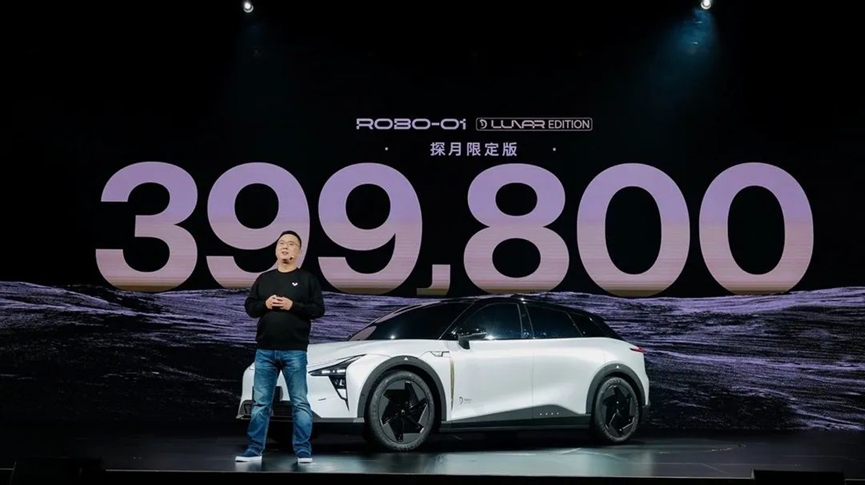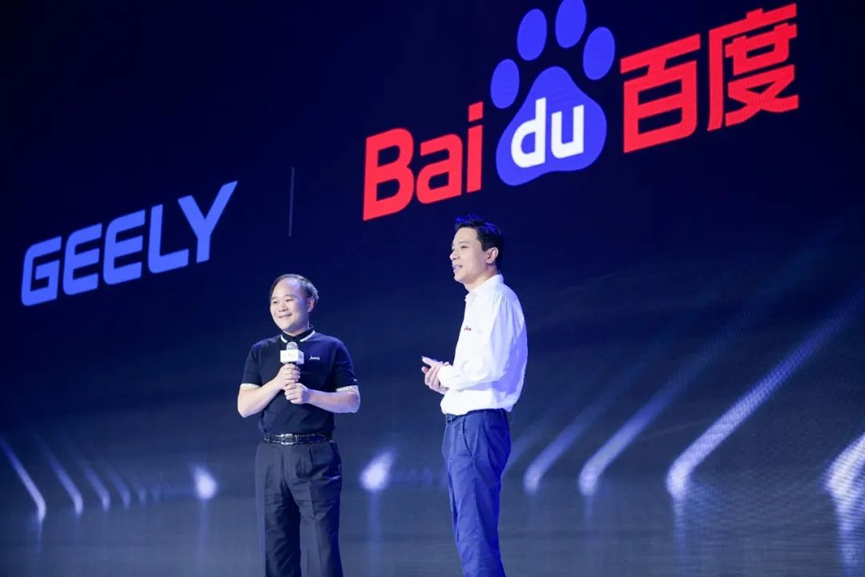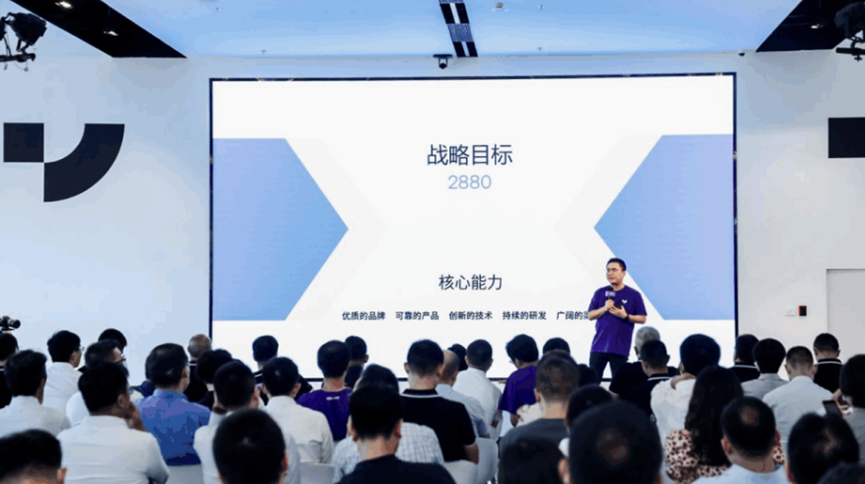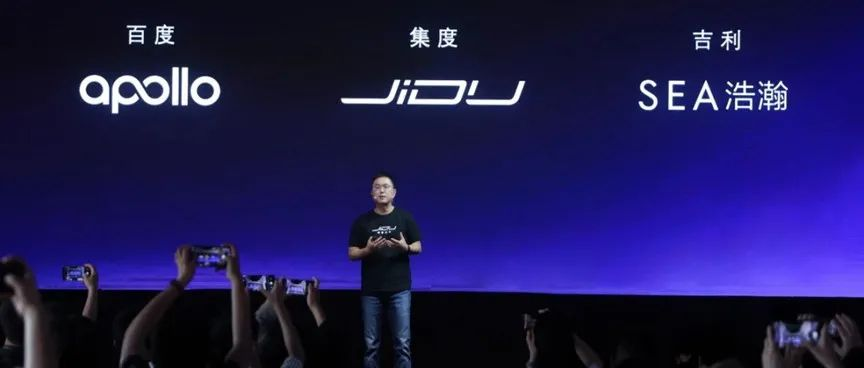Author: Yungo
In the wave of carmaking, the crazy burning of money can hardly stop the continuous influx of latecomers.
Less than two years after Baidu announced its entry into the carmaking industry, Jidu Auto, Baidu’s exclusive carmaking company, has launched a mass-produced car.
On October 27th, Jidu’s first car-making robot, ROBO-01 Lunar Edition, was officially released, with a new car price of 399,800 yuan. The standard production model is scheduled to debut at the Guangzhou Auto Show later this year, with deliveries starting in 2023.

Backed by Baidu and Geely, two major players in the industry, Jidu, born with a “golden spoon” in its mouth, possesses multiple strengths such as capital, industry, and technology that other latecomers in the carmaking industry find hard to compete with.
Up to the launch of ROBO-01 Lunar Edition, Jidu Auto had been in existence for over a year without ever putting a product on the market. The so-called brand image and user confidence were just confined to Jidu’s PPT.
With rising raw material prices, chip shortages, and the COVID-19 pandemic causing severe interruptions, Jidu, which is approaching its second anniversary, is now faced with increasingly fierce competition in the market – can it still deliver satisfactory results?
Jidu = Baidu + Geely?
This is how Jidu Auto, Baidu, and Geely are introduced on Jidu’s official website: Jidu is a car-making robot start-up company initiated and established by Baidu and strategically invested by Geely.

Compared with other new disruptors in car-making, Jidu Auto has won the race at the starting line.
In the early days, Baidu and Geely invested more than 300 million US dollars, with each holding 55% and 45% respectively. In January 2022, they jointly increased their investment by nearly 400 million US dollars. In terms of funding, Jidu Auto is like a “rich second generation” in the car market, without worrying about capital.
In addition to financial investment, there is also technical support. On the one hand, Jidu Auto is supported by Baidu Apollo, a leading representative of domestic autonomous driving technology. On the other hand, Jidu Auto’s production is also backed by Geely’s SEA Haohan platform.# Is Jointstech Really Safe Behind Baidu and Geely’s Backing?
Does Jointstech really have nothing to worry about with Baidu and Geely backing it up? Based on the initial demands of the two companies, Jointstech seems more like a trial collaboration between the two.
For Baidu, after years of deep cultivation in the field of autonomous driving, its technological advantages are obvious. However, given the long delay in the commercialization of vehicle production, Baidu urgently needs to prove its technical strength through product landing in order to bring in more cooperation. Meanwhile, Geely has a rich product line, including independent electric vehicle brands such as Lynk & Co, Geometry, and PROS. With Jointstech serving as its joint venture brand, Geely can enter the field of autonomous driving more quickly.
However, Jointstech CEO Xia Yiping emphasized in an interview that “Jointstech is a relatively independent operating company, and cooperation with Baidu and Geely is a commercial model.” Therefore, it seems that the relationship between Jointstech and Baidu and Geely is more like a “buyer and seller” relationship.
Whether Baidu and Geely, as suppliers, can fully provide technological output for Jointstech’s Sea Star platform and Appollo, remains an unknown answer.
How to effectively coordinate Baidu and Geely’s internal advantages is a challenge that Jointstech must face.
On June 30th, news about Geely exiting from Jointstech spread like wildfire.
According to enterprise information from Qichacha, the shareholder of Jointstech has changed, with Baidu’s wholly-owned subsidiary “Dongdazi County Bairuixiang Entrepreneurship Investment Management Co., Ltd.” increasing its shareholding percentage from 55% to 100%, and Geely’s Shanghai Maple Automobile Co., Ltd. exiting. Key members Xia Yiping, An Conghui, and Li Donghui also resigned from the board.
In response, Jointstech, Baidu, and Geely quickly denied the rumor, emphasizing that “this is a normal adjustment based on business development needs. Jointstech is still jointly held by Baidu and Geely, and their respective shareholdings have not changed.”
Under the quick denial of the three parties, the controversial rumors have come to an end. However, the interests involved and the balance of interests between the parties have gradually surfaced.
Tech Selfie: Car RobotsAt the beginning, intelligence was the breakthrough point for Jetta.
Auto robots, which is Jetta’s technology label, are differentiated from the market by “high-tech” and “intelligence”. Li Yanhong publicly stated that “as far as autonomous driving is concerned, Jetta will lead Tesla by a generation.”
In order to highlight its uniqueness, advanced autonomous driving, “jumping lights” LiDAR, disappearing B-pillars, integrated “fish screen”, scissor doors, foldable U-shaped steering wheel, and cancellation of traditional door handles became the keywords of Jetta’s “metaverse” concept car launch on June 8th, and Xia Yiping promised that the concept car and mass-produced car would be nearly 90% similar.
Advanced autonomous driving is considered one of Jetta’s core competencies.
According to the introduction of Jetta ROBO-01 lunar exploration limited edition launch event on October 27th, when the product is mass-produced and delivered, it will have the advanced intelligent driving ability in the “three-domain integration” of high-speed, city, and parking. In order to achieve advanced autonomous driving, the hardware configuration of ROBO-01 lunar exploration limited edition is equipped with two NVIDIA Orin X chips, two LiDARs, five millimeter-wave radars, 12 ultrasonic radars, and 12 high-definition cameras. In terms of hardware configuration, it is absolutely among the top tier of the industry. At the algorithm level, Jetta’s biggest reliance is Baidu Apollo’s advanced autonomous driving ability. Baidu Apollo’s technical strength is beyond doubt, but Baidu Apollo is mainly used as a Robo taxi operation platform, more like a shared ride-hailing platform for self-driving cars. However, Jetta sells products directly to consumers and cannot completely copy Baidu’s technical solutions. The effectiveness of Jetta’s intelligent technology remains to be tested.
In addition, the “jumping lights” LiDAR, which caused a lot of discussion, has been cancelled in mass-produced cars and replaced directly into the headlight group. The new design scheme is generally no different from that of XPeng P5. The technical dispute between Xia Yiping and Li Xiang on Weibo about the position and quantity of LiDARs in the early stage looks more like a Jetta’s advertising and marketing campaign.
However, the design of the U-shaped steering wheel has been preserved in mass-produced models. If there is no change in mass production, Jetta will be the first car model in China to adopt the U-shaped steering wheel. As for the practicality, safety, and legality of the U-shaped steering wheel, it remains to be seen whether people who are accustomed to circular steering wheels can really adapt to the U-shaped steering wheel.
The door handle that needs to be canceled needs to be mature in both hardware and software to avoid the situation of intelligent becoming stupid.
Ideals are full, but reality is harsh. Consumers have their own judgments on whether the mass-produced car and the concept car are close to 90% similarity. Whether the price of 399,800 yuan can achieve the goal of monthly sales of 10,000 units still needs to be verified when it is officially launched.
Strategic goal: Can the 2880 plan come true?
If selling 10,000 cars per month is the short-term goal of Jidu Motors, then the “2880” plan is its future goal.
On August 8th this year, Xia Yiping announced the “2880 Plan” at the first Jidu Automobile Robot Ecological Partner Conference. The “2880 Plan” means that by 2028, Jidu Motors will have the ability to deliver 800,000 car robots throughout the year.

As a new car-making brand, Jidu Motors will start delivering its cars by 2023, which means that Jidu only has only five years to achieve the leap from 0 to 800,000. In the process of achieving this goal, Xia Yiping revealed that Jidu will launch a new product every year, and by 2028, it will have a product lineup of 6 models. This also means that each model of Jidu Motors needs to become a hit in order to support annual sales of more than 100,000 units for each model.
For most traditional car manufacturers and new car-making companies, delivering 800,000 cars per year is still a huge challenge. Although Jidu Motors’ target of 800,000 cars is to be achieved by 2028, a substantial increase in short-term delivery for any automaker is a challenge.
According to Jidu Motors’ plan, the first flagship store will open in Shanghai this year, and it plans to enter 46 cities by 2023 and complete a layout of 100 sales networks.
As a new car brand, Jidu Motors’ development is full of great uncertainty. From the situation of new car-making companies in the market, many enterprises have been eliminated. From this perspective, although Jidu has the technical support of Geely and Baidu, they do not participate in the product and related operations. Whether the final product can be recognized by the market is still unknown.Delivery is the goal, survival is the reality.
In August, according to Bloomberg, Jidu is considering a new round of financing, hoping to raise $300 million to $400 million. This means that in addition to Geely and Baidu, Jidu Motors needs to introduce other investors. This is mainly due to two reasons: on the one hand, creating a car is very expensive and requires a large amount of external funding and industry resources. Currently, relying solely on Baidu and Geely cannot fully cover the cost. Secondly, from a technical point of view, autonomous driving is still not mature, and the relevant laws and regulations are not perfect, which cannot meet the landing of advanced autonomous driving.
As a latecomer in the intelligent electric vehicle industry, how can Jidu create a differentiated experience and have the ability to deliver 800,000 car products annually in 2028 in the increasingly crowded arena? This is a bigger challenge for Jidu Motors.
At present, in the context of frequent launches of new cars, the attitude and user confidence that new car manufacturers hold may be even more important than the products themselves.
This article is a translation by ChatGPT of a Chinese report from 42HOW. If you have any questions about it, please email bd@42how.com.
